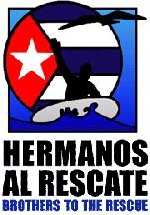 August 20, 1996
August 20, 1996
Amb. Stuart E. Eizenstat
Special Representative of the President
and Secretary of State for the Promotion
of Democracy in Cuba Washington, D.C.
Re Brothers to the Rescue
Dear Mr. Eizenstat:
We wish to congratulate you on your recent appointment as Special Representative of the
President and Secretary of State for the Promotion of Democracy in Cuba and we thank you
for inviting us to participate in a meeting with you concerning U S foreign policy to Cuba
Unfortunately, until we obtain a response from the U S government, to various questions
concerning its own conduct during the February 24, 1996 shoot-down of our aircraft, it
will be difficult for us to participate in any constructive talks with the U S government
regarding its foreign policy toward Cuba. We would appreciate your assistance in obtaining
a response to the following questions:
1. Why did the U S. allow the shoot down of two of our U.S registered aircraft and the
murder of three U S citizens and one legal resident by not warning Brothers to the Rescue
of i) Cuba's threat to shoot down exile aircraft a few weeks before; ii) the
fact that the U S believed Cuba to be in a particularly "rough mood" that day;
and iii) that Cuban MiGs had been seen and were being monitored prior to our
take-off, in the exact area where the U S and Cuba knew Brothers to the Rescue was to
conduct its search and rescue mission that day?
2. Why did the U.S. fail to give Brothers to the Rescue notice in the air, via radio or
telephone, as it has on various occasions in the past, of the presence of the Cuban MiGs
and their systematic shoot-down and murder of our pilots? Why did the Air Force and
Customs watch the radar screen for 53 minutes without doing anything?
3. Why, after the shoot down of the first two Brothers to the Rescue aircraft, did the
U.S. allow the remaining BTTR aircraft to be pursued by two MiGs to within sight of Key
West without warning BTTR or taking steps to prevent the potential massacre?
4. Why and who gave the order to stop [the standard operating procedure of launching
interceptors to assist BTTR after the MiGs had crossed the "trigger line" of the
procedure and were well into U.S. controlled airspace?
As concerns the issues to be discussed at today's meeting we feel that a one day
"whirlwind" tour of some of the Cuban exile organizations is not sufficient to
establish any sort of consensus or cooperation between the parties and that more formal
and lengthy discussions should be held. Our presence at this meeting is not to be
construed as our approval of the measures being proposed. In fact some of these measures,
without a more comprehensive policy toward Cuba may prove to be counterproductive
We look forward to receiving answers to these questions, as well as establishing a
reciprocally cooperative relationship with the U.S. government
Sincerely,
Brothers to the Rescue
Jose J. Basulto, President